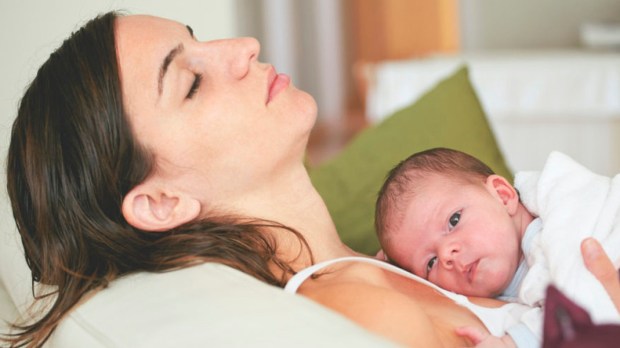One of my favorite moments as a mom happened two days in. It was one of the very first times my newborn baby woke up me in the middle of the night with his cries. As I gathered him in my arms, ready to feed him, his eyes locked on mine and I melted. Though I’d loved my two-day-old son from the moment I knew he existed, that was the moment I fell in love. I was so grateful for that sweet, quiet moment in the middle of the night.
Because truth be told, as motherhood went on, as I added two more children who didn’t love to sleep through the night to the mix, my emotions continued to overwhelm me, but not often in a good way. In fact, many of my worst moments as a mom come straight out of the seemingly unending exhaustion of raising kids.
And — make no mistake — that exhaustion, both mental and physical, is real. A study recently revealed what mothers have long suspected to be true: having kids means less sleep for mom, while not necessarily less for dad. And, in fact, the more children a woman has, the less sleep she gets. Not surprising, right? As moms, the things that keep us up at night don’t always center around the physical act of getting up, it’s often waiting up for teens, or worrying about our kids that causes sleepless nights, too!
But here’s the thing: Just because moms don’t get enough sleep, doesn’t mean we should all give up on trying get more, or at least better, ZZZs. So we checked with with several sleep experts for their best advice on getting a great night’s sleep, even when that shuteye is hard to come by. Here’s what they had to say.
Check your “sleep hygiene”
While most of us think we do well when it comes to personal hygiene, we’re probably not up to snuff when it comes to sleep hygiene, which simply means, according to Carolina Romanyuk, child and family sleep consultant, author, and creator of the program, The Sleep Trifecta, “behavioral and environmental practices that are intended to promote better quality sleep.”
According to Romanyuk, this means things like: No electronics for at least an hour before bed, keeping a consistent bedtime and wake-up time when you can (it takes discipline!), and keeping a clutter-free bedroom to minimize stress and worry at bedtime.
Dr. Robert Oexman, director of the Sleep to Live Institute in Mebane, North Carolina, adds a few other areas of proper sleep hygiene to this list. Oexman suggests keeping the light, noise, and temperatures in our bedrooms down. “Your bedroom should be completely dark,” Oexman says. And he encourages people to invest in a white noise machine or use a white noise app. As far as temperature goes, Oexman suggests a bedroom between 65 and 68 degrees. Studies show people living near the equator have the highest levels of insomnia, while chilly Scandinavians leave the windows open and sleep great!
Consider the bedding
Dr. Oexman suggests paying more attention to what’s on our beds before we even get in them. “You must choose the correct mattress and pillow for your body type,” he says. “When buying a new mattress, remember to look for the 90 night guarantee that many mattress companies offer, and take that time to make sure your mattress is truly comfortable.” It can take a while to figure out if a mattress is right for you, so being able to try and return is safest.

Read more:
6 Nighttime snacks that can help you sleep better
He also suggests using separate sheets and blankets. “Avoid a fight over the blankets by using your own,” Oexman says. “You can share one fitted sheet — but for each side of the bed, use your own top sheet and blanket. Simply cover it with a duvet, and no one will see the difference.”
Eileen Parker suggests using weighted blankets — and Parker literally wrote the book on weighted blankets, so she speaks from experience. These special blankets have two layers of heavy plastic pellets sewn into the inside of the fabric to give it the extra weight, “helping people relax and sleep from the gentle pressure it puts on the body,” Parker explains.
The other good news? “They are so effective,” she says, “hospitals use them, and for certain disorders, medical insurance will cover them.”
Watch what you eat
Dr. Fran Wolfish, a family and relationship psychotherapist and author of The Self-Aware Parent, says sleep disruption happens any time “we are stressed, going through major changes or life transitions.” Which obviously includes raising kids! Wolfish recommends eating the right things to help get your body ready for sleep. Here are her top five pre-bed snacks:
1. Drink milk before bed. Yes, there is a little truth to that old saying about hot milk! You should also consider eating turkey, cheese, yogurt, or ice-cream as an after-dinner snack a few hours before hitting the hay. The tryptophan in these foods has a natural calming agent that actually relaxes you without medication.
2. Eat oats and oatmeal. They are rich in melatonin, a hormone that promotes sleep.
3. And drizzle some honey on top. A little bit of honey as a nightcap not only tastes good but contains glucose, which sends a message to the brain telling it to shut off orexin. Also known as hypocretin, orexin is the chemical that regulates arousal, wakefulness, and appetite.
4. Or add bananas. Bananas are high in magnesium. They’re also rich in sleep-promoting hormones serotonin and melatonin.
5. Keep a finger bowl of almonds by the bed. Like turkey and dairy products, almonds are also rich in tryptophan, but have the added benefit of magnesium, a muscle-relaxant that, along with that tryptophan, helps to naturally reduce muscle and nerve function while also steadying your heart rhythm.
Use mindful meditation
Romanyuk also believes in using meditation for better sleep. She suggests a nice stretching pose called “legs on the wall” to “reduce anxiety, calm the nervous system, and get the blood moving rapidly.”
But she also suggests some mediation apps, that talk you through a short meditation session, and can help moms relax. Her favotires to recommend are: Headspace, Insight Timer, Calm, and Omvana.
Of course, a nighttime prayer also helps!
Get the essentials
While essential oils are all the rage, the powers of lavender to help us sleep have been known for a long time.
“Research has shown that the compounds in lavender essential oil produce slight calming, soothing, and sedative effects when the scent is inhaled,” says Rachel Delia, whose company sells lavender-scented lotions and lip balms. “According to the National Sleep Foundation, smelling lavender has been shown to decrease heart rate and blood pressure, which can calm and relax the body, helping you to fall asleep.”
And lavender is easy to work into a busy mom’s life, she says. “By simply smelling these products before bed, you can uncap the aromatherapy benefits of essential oils.”
Sleep tight!

Read more:
What to do with your mind when your worries won’t let you sleep

